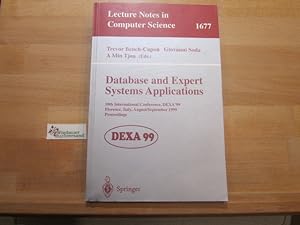Synopsis
The Database and Expert Systems Applications (DEXA) conferences bring together researchers and practitioners from all over the world to exchange ideas, experiences and opinions in a friendly and stimulating environment. The papers are at once a record of what has been achieved and the first steps towards shaping the future of information systems. DEXA covers a broad field, and all aspects of database, knowledge base and related technologies and their applications are represented. Once again there were a good number of submissions: 241 papers were submitted and of these the programme committee selected 103 to be presented. DEXA’99 took place in Florence and was the tenth conference in the series, following events in Vienna, Berlin, Valencia, Prague, Athens, London, Zurich, Toulouse and Vienna. The decade has seen many developments in the areas covered by DEXA, developments in which DEXA has played its part. I would like to express thanks to all the institutions which have actively supported and made possible this conference, namely: • University of Florence, Italy • IDG CNR, Italy • FAW – University of Linz, Austria • Austrian Computer Society • DEXA Association In addition, we must thank all the people who have contributed their time and effort to make the conference possible. Special thanks go to Maria Schweikert (Technical University of Vienna), M. Neubauer and G. Wagner (FAW, University of Linz). We must also thank all the members of the programme committee, whose careful reviews are important to the quality of the conference.
Synopsis
This book constitutes the refereed proceedings of the 10th International Conference on Database and Expert Systems Applications, DEXA'99, held in Florence, Italy in August/September 1999. The 105 revised papers presented together with three invited papers were carefully reviewed and selected from a total of 241 submissions. The volume addresses all current aspects of advanced information systems applications. The papers are organized in topical sections on object-oriented databases; fundamentals; queries; advanced information systems; workflow management systems; heterogeneous, distributed, and federated databases; transactions; data warehousing and data mining; spatial databases; internet applications; and temporal databases.
"About this title" may belong to another edition of this title.
